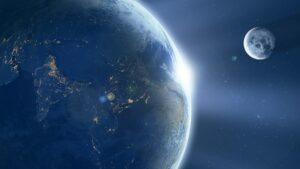Imagine a black hole as a cosmic vacuum cleaner but on a massive scale that could gobble up entire stars. These celestial monsters are born from the remnants of colossal stars that collapse under their weight.
They’re like cosmic enigmas, captivating yet scary at the same time.
Now, picture this: What if one of these black holes barreled towards Earth?
Well, it’s not a pretty picture. Earth would be toast!
The pull of a black hole is so fierce that it would rip our planet to shreds. The “point of no return,” called the event horizon, would hover just a stone’s throw above Earth’s surface. Everything nearby would get slurped in – the air we breathe, the ground beneath our feet, everything. The aftermath? Catastrophic. Earth’s debris would scatter into space, while the black hole would carry on its feast through the cosmos.
But don’t lose sleep over it – the odds of a black hole smacking into Earth are slimmer than winning the lottery. I’m talking a measly 1 in 100 billion chance. Compare that to your chances of hitting the jackpot – way higher!
So, while it’s a wild idea, it’s about as likely as Jim Carrey quoting “Dumb and Dumber” in space. It’s still fun to ponder, right? So, let’s dive into the basics of this cosmic puzzle.
How Many Black Holes Are There?
Estimating the count of black holes in the universe is a bit like trying to tally the grains of sand on a beach, except way trickier.
You see, black holes don’t exactly light up the sky. They’re like cosmic ninjas – silent and stealthy. So, instead of spotting them directly, scientists have to play detective. They watch how nearby stuff, like stars or gas, dances around them due to their immense gravity.
From these cosmic clues, scientists figure there’s a boatload of black holes in our Milky Way – millions, maybe even billions.
Now, zoom out a bit. Consider there are billions upon billions of galaxies out there. Crunch the numbers, and you’re looking at trillions, maybe even zillions, of black holes in the observable universe.
But not all black holes are cut from the same cloth. Some are puny, formed from collapsing stars – stellar black holes. Others are a bit beefier, resulting from merging black holes – those are the intermediate ones. And then there are the heavyweights, the supermassive black holes, chilling at the hearts of galaxies like ours.
Speaking of which, our galaxy’s heavyweight champ goes by Sagittarius A*, or if you’re feeling casual, just Sagittarius A star.
Now, armed with this info, let’s ponder the big question: Can we predict if these cosmic giants are on a collision course?
Can We Predict the Potential Collision Between Earth and a Black Hole?
We’re not equipped with the tools to directly foresee when or where a black hole might collide with Earth. But don’t worry; scientists are on it, tirelessly working on new ways to track these cosmic wanderers.

One promising method involves gravitational wave detectors. These gadgets pick up the faint ripples in space-time caused by colossal collisions, like when two black holes smash into each other. By studying these waves, scientists can determine where and how big the black holes are.
Another approach relies on computer simulations. Scientists can simulate the dance of black holes through space, forecasting their future paths. But keep in mind that these simulations are only as good as the data fed into them.
So, armed with all this knowledge, let’s tackle the question we started with. First, we’ll break it down with a simple step-by-step model. Then, we’ll dive deeper into what might happen to Earth and the entire Solar System if such a collision occurs.
What Would Happen if a Black Hole Collided with Earth? – A Step-by-Step Analysis:
So, if a black hole decided to visit Earth, it’d be a catastrophe of epic proportions. Here’s how it would all unfold, step by step:
First, its monstrous gravitational pull would start messing with Earth’s orbit before the black hole gets close. As it inches nearer, that pull would get stronger and stronger, throwing everything out of whack.
Then, when it’s practically at our doorstep, chaos ensues. The black hole’s gravity would start tearing Earth apart, stretching and squishing it like cosmic taffy. Picture massive quakes and volcanic eruptions shaking the ground. As the black hole munches on our planet, it forms this swirling disk of debris around itself. This disk becomes a blazing inferno, blasting radiation and heat that’d fry anything in its path – say goodbye to any chance of survival.
Eventually, Earth gets slurped up entirely, leaving behind nothing but a point of infinite density and gravity – a singularity. You might wonder if Earth has any tricks to fend off such a cosmic bully.
Well, it’s a temporary fix at best.
Let’s dig into that next…
Read Also: What If Earth Had Two Moons?
Earth’s Defense Mechanisms
Atmospheric Shielding
When facing the wrath of a black hole, Earth’s atmosphere would put up a bit of a fight – but just at the start.
As the black hole closes in, it hits our atmosphere’s outer layers, heating up and spewing radiation.
This radiation mixes it up with the air, forming a shield that absorbs some of the black hole’s energy, stopping it from wreaking havoc on the surface.
But here’s the catch: this shield can only hold out for so long.
Then, there’s our magnetic field to consider.
Magnetic Field Protection
Earth’s magnetic field steps into the ring, too, offering a bit of defence against a black hole brawl. As the cosmic menace creeps closer, it grapples with our magnetic field, slowing down and veering off course. This tug-of-war lessens the blow it could deliver to our planet’s surface.
But here’s the thing: this protection isn’t foolproof, just like with the atmospheric shield. It all boils down to the size and strength of the black hole. It could overpower our magnetic field and spell disaster for Earth if it’s a real heavyweight.
So, if a black hole decided to crash our cosmic party, Earth wouldn’t stand a chance.
But what about our lunar buddy, the Moon? Let’s take a closer look at its fate next.

Effects on the Moon
The Moon would be the first in line to feel the black hole’s gravitational squeeze. But whether it survives or not depends on the black hole’s size.
Here’s what could happen to our lunar buddy:
Orbital Chaos: The black hole’s gravity could mess with the Moon’s orbit, making it more oval-shaped or sending it on a new path around Earth.
Tidal Trouble: Those tidal forces from the black hole could stretch and twist the Moon, messing up its insides and maybe even causing cracks on its surface.
Roche Rumbles: The Roche limit is a danger zone for celestial bodies. If the black hole gets too close, it could push the Moon beyond this limit, tearing it apart.
Black Hole Capture: Depending on how things play out, the Moon might get snagged by the black hole’s gravity, orbiting around it like a tiny satellite, or it could get sucked in altogether.
Solar system Swerve: In a wild scenario, the Moon might get a cosmic kick from the black hole, flying out of the solar system entirely. Picture it like the Moon breaking free from Earth’s grip and zooming off into deep space.
So yeah, it’s not a great outlook for the Moon either!
But what about the rest of the gang – the other planets and the whole solar system? Let’s dive into that next.
Post-Impact Solar System
Let’s talk about the other planets in our cosmic neighbourhood.
They’dThey’dfates similar to those of the Moon – it all hinges on the black hole’s size.
Sure, the farther-out planets might dodge some of the chaos, but if we’re dealing with a real behemoth of a black hole, they could still get hit hard. Think of messed-up rotations, lost moons, or getting gobbled up or kicked out of orbit.
Long story short, it’s bad news for any planet in the Solar System.
If this theoretical black hole decided to munch on Earth, it’d wreak havoc on the whole gang – the entire solar system would feel the pain. And here’s the kicker: Could a black hole wipe out the entire solar system?
Well, “destroy” might be a bit strong, but a big enough black hole could certainly shake things up big time. There are two main scenarios: the black hole slurps everything or kicks us into the cosmic void. The second option is more likely. If a black hole got too cozy with our solar system, its crazy gravity could mess with our orbits, sending us into the dark abyss.
Mind-blowing, right?
Let’s not lose sleep over it. Remember, the odds of this cosmic disaster are about as likely as winning the lottery – like, next to impossible.
So yeah, chances are, we’re safe from getting swallowed by a black hole.
